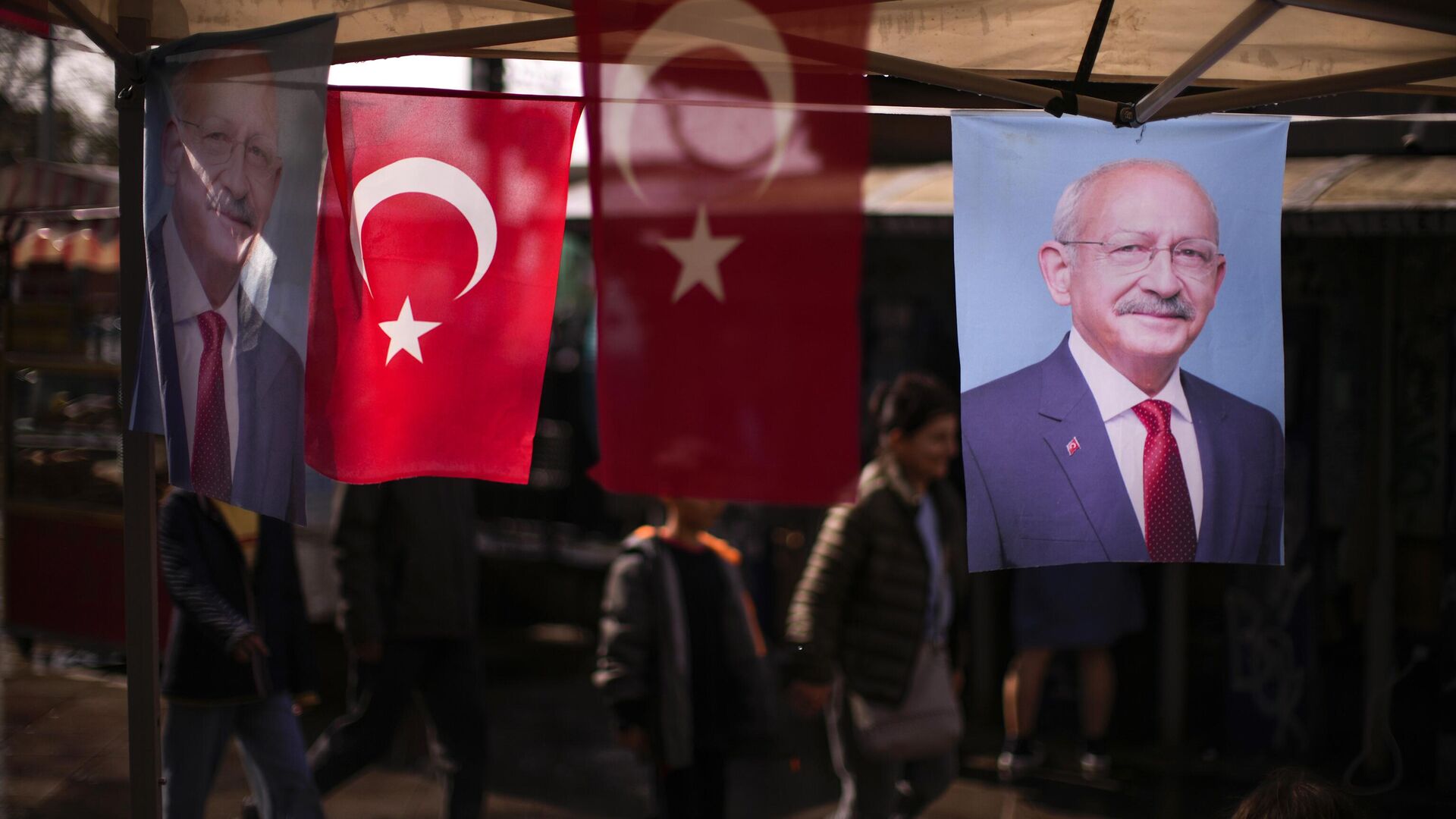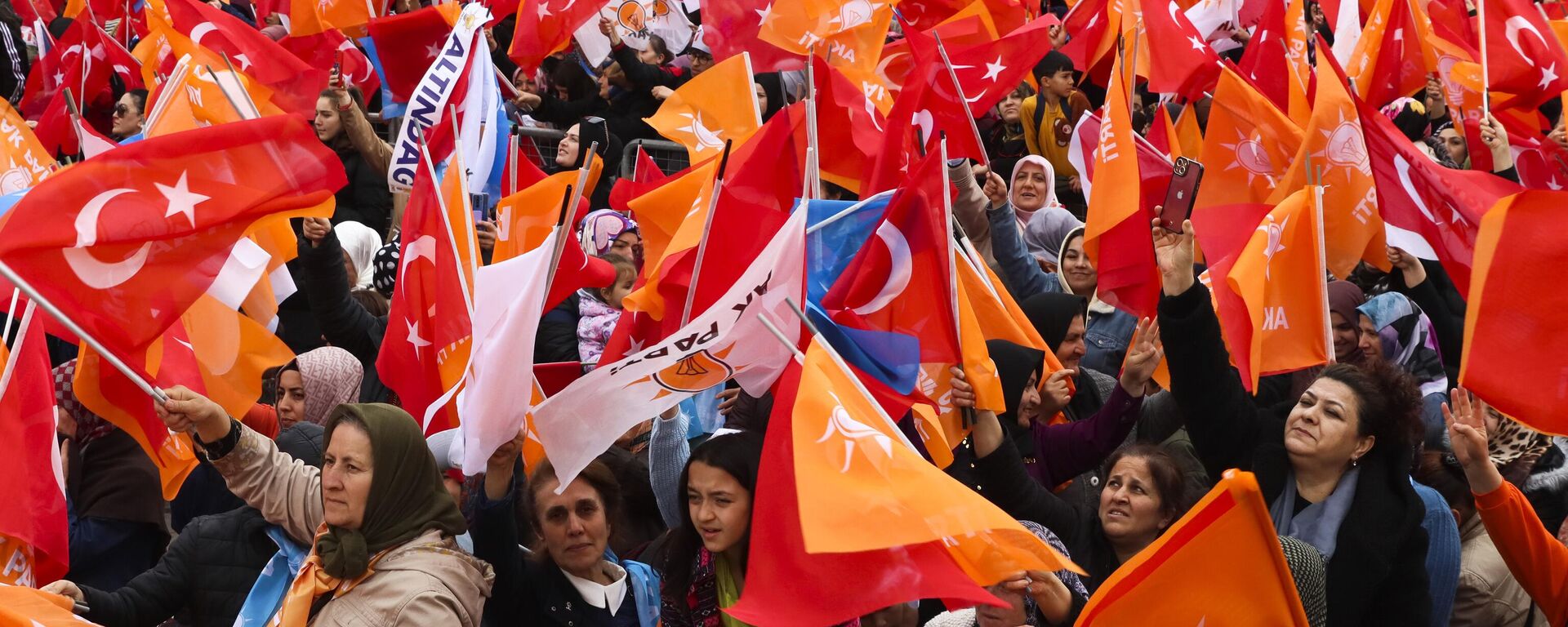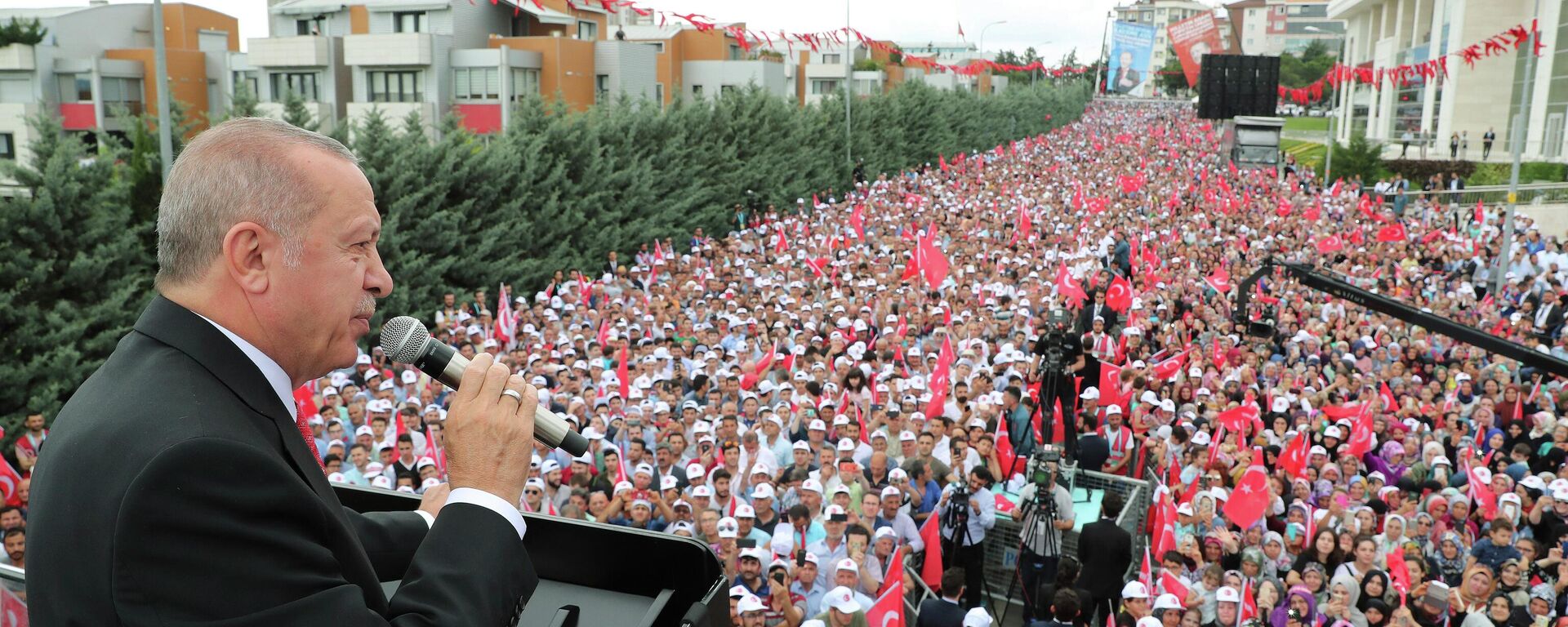https://sputnikglobe.com/20230516/turkiye-will-continue-to-walk-tightrope-between-west-and-east-if-kilicdaroglu-wins-1110405544.html
Turkiye Will Continue to Walk Tightrope Between West and East if Kilicdaroglu Wins
Turkiye Will Continue to Walk Tightrope Between West and East if Kilicdaroglu Wins
Sputnik International
Turkish President Recep Tayyip Erdogan and rival Kemal Kilicdaroglu will head to a second-round vote on May 28. Both candidates have strong and weak points, as Turkiye is balancing between East and West, Sputnik interlocutors say.
2023-05-16T21:57+0000
2023-05-16T21:57+0000
2023-05-17T11:58+0000
analysis
recep tayyip erdogan
kemal kilicdaroglu
sinan ogan
turkiye
russia
east
nato
european union (eu)
opinion
https://cdn1.img.sputnikglobe.com/img/07e7/04/13/1109671580_0:160:3072:1888_1920x0_80_0_0_23690fe7a9469f27a077a58657b30863.jpg
"People in Turkiye have had their foreign policy worldview shaped significantly by the state’s long-standing tendency to not take a global stance too strongly unless they absolutely have too," F. Michael Wuthrich, associate professor of political science and associate director of Kansas University's Center for Global & International Studies, told Sputnik. The West is leaning towards Kilicdaroglu not because of any sort of personal closeness between him and these foreign leaders, but because the opposition leader's ideas resonate with the US and European leadership, according to the professor.The runoff election will be monitored closely both the Western countries or EU member states and NATO member states, the United States, and of course Russia and China, "because, at the moment, there is a geopolitical fragmentation at the global level," according to Dr. Pierre-Emmanuel Thomann, professor of geopolitics and director of Eurocontinent, an international organization based in Brussels.Kilicdaroglu and ErdoganErdogan came out on top in the first round by gaining 49.5% of the vote compared with 44.9% for his major rival. The Western press notes the Turkish president performed better than expected citing earlier surveys. Now, the media is weighing up Erdogan and Kilicdaroglu election odds.Kilicdaroglu recently addressed the Turkish youth with references to the cost-of-living crisis. He argued the return to Western-style orthodox monetary policies and closer alliance with the West could save the day for the country.At the same time, some political observers have drawn attention to the fact that even though Turkiye is suffering from galloping inflation, Erdogan's plan to put national security interests above economic challenges has worked, resonating with Turkish conservatives and nationalists. One of the clear manifestations of that is Erdogan's coalition winning the majority in the parliament.It's also unclear whether nationalist candidate Sinan Ogan's voters will support Kilicdaroglu - Ogan came third with 5.2% support. Speaking to US media on Monday, Ogan said he would endorse Kilicdaroglu only if the contender ruled out any concessions to the Peoples' Democratic Party (HDP). It was earlier reported Kilicdaroglu met with HDP co-leaders, and that they supported the Nation Alliance. Some media saw Ogan's words as a potential boost for Erdogan.Turkiye's Major Course is Likely to Remain IntactSputnik's interlocutors agree that under the current economic conditions and due to its unique geopolitical position Turkiye cannot considerably change its course being already split between the West and the East. It's most likely Ankara will continue to walk this tightrope, regardless of who will win, according to the observers."Turkiye is both a member of NATO and at the same time, it is a part of the Middle East and also Eurasia," explained Thomann. "Turkiye wants to be a pivot and to gain an advantage in all different circles. So it will continue to play the role of a NATO-member state, with the US to counterbalance Russia in the Caucasus and in Syria and try to expand its influence in Central Asia. At the same time, it will still negotiate with Russia (…) We have some common positions to negotiate to avoid the conflict, but also to raise our own profile and power, like the conflict in Syria. For example, Turkiye-Syria relations are supervised by Russia, and I don't think Turkiye is on the way to changing that. They will continue to do both East and West positioning."For his part, Wuthrich noted that in some sense, Erdogan is no less "westernized" than Kilicdaroglu, even though the incumbent Turkish president is portrayed as an East-leaning leader due to his ties with Russia and China:"In Turkey traditional ideological foundations, Eurasianism has been the vision of many in the Turkish left and Turkish nationalist far right. Kilicdaroglu’s ideological tradition would likely value European practices, particularly in North and Western Europe, more so than the United States. Erdogan is far more aligned with American economic liberalism than Kilicdaroglu would be," Wuthrich concluded.
https://sputnikglobe.com/20230515/turkiye-wont-turn-its-back-on-russia-whoever-wins-presidential-runoff-1110386303.html
https://sputnikglobe.com/20230516/turkiye-election-shattered-the-illusion-that-erdogan-was-untouchable-1110392035.html
turkiye
russia
east
Sputnik International
feedback@sputniknews.com
+74956456601
MIA „Rossiya Segodnya“
2023
News
en_EN
Sputnik International
feedback@sputniknews.com
+74956456601
MIA „Rossiya Segodnya“
Sputnik International
feedback@sputniknews.com
+74956456601
MIA „Rossiya Segodnya“
turkiye elections, turkiye presidential runoff, recep tayyip erdogan, kemal kilicdaroglu, syria, russia, china, us-turkish relations, eu-turkish relations, turkiye geopolitical agenda, ankara nato alliance, turkiye geostrategy
turkiye elections, turkiye presidential runoff, recep tayyip erdogan, kemal kilicdaroglu, syria, russia, china, us-turkish relations, eu-turkish relations, turkiye geopolitical agenda, ankara nato alliance, turkiye geostrategy
Turkiye Will Continue to Walk Tightrope Between West and East if Kilicdaroglu Wins
21:57 GMT 16.05.2023 (Updated: 11:58 GMT 17.05.2023) Turkish President Recep Tayyip Erdogan and his rival Kemal Kilicdaroglu are heading to a second-round vote due to take place on May 28. Both candidates have strong and weak points, as Turkiye is balancing between East and West, Sputnik's interlocutors say.
"People in Turkiye have had their foreign policy worldview shaped significantly by the state’s long-standing tendency to not take a global stance too strongly unless they absolutely have too," F. Michael Wuthrich, associate professor of political science and associate director of Kansas University's Center for Global & International Studies, told Sputnik.
"Therefore, I think any changes in Turkiye’s geopolitical alignment would be mostly minor and gradual, and such anticipation is also consistent with the personality and character of Kilicdaroglu in general."
The West is leaning towards Kilicdaroglu not because of any sort of personal closeness between him and these foreign leaders, but because the opposition leader's ideas resonate with the US and European leadership, according to the professor.
The runoff election will be monitored closely both the Western countries or EU member states and NATO member states, the United States, and of course Russia and China, "because, at the moment, there is a geopolitical fragmentation at the global level," according to Dr. Pierre-Emmanuel Thomann, professor of geopolitics and director of Eurocontinent, an international organization based in Brussels.
"The United States and its NATO allies in Europe are regrouping behind the American objectives and against Russia and China, also through the conflict in Ukraine," Thomann told Sputnik. "So there is a Eurasian fragmentation. Actually each camp, each alliance of countries, would like it if Turkiye changed its course. The United States and the EU member states, they would like Turkiye to be more against Russia and to stop engaging in commerce with Russia, and to apply sanctions and also to be tougher on Russia, because that's their adversary at the moment."
Erdogan came out on top in the first round by
gaining 49.5% of the vote compared with 44.9% for his major rival. The Western press notes the Turkish president performed better than expected citing earlier surveys. Now, the media is weighing up Erdogan and Kilicdaroglu
election odds.
Kilicdaroglu recently addressed the Turkish youth with references to the cost-of-living crisis. He argued the return to Western-style orthodox monetary policies and closer alliance with the West could save the day for the country.
At the same time, some political observers have drawn attention to the fact that even though Turkiye is suffering from galloping inflation, Erdogan's plan to put national security interests above economic challenges has worked, resonating with Turkish conservatives and nationalists. One of the clear manifestations of that is Erdogan's coalition winning the majority in the parliament.
On the other hand, Kilicdaroglu, who has been heading the Republican People’s Party (CHP) since 2010, appears to have made a mistake by preventing younger and popular party fellows from throwing their hats into the ring, according to some commentators.
Furthermore, since 2010, Kilicdaroglu's CHP has not scored any serious victories on the Turkish political arena. Additionally, they argue Kilicdaroglu's six-party Nation Alliance appears to be not that united, which evokes memories of government crises under previous coalition governments among Turks.
It's also unclear whether nationalist candidate Sinan Ogan's voters will support Kilicdaroglu - Ogan came third with 5.2% support. Speaking to US media on Monday, Ogan said he would endorse Kilicdaroglu only if the contender ruled out any concessions to the Peoples' Democratic Party (HDP). It was earlier reported Kilicdaroglu met with HDP co-leaders, and that they supported the Nation Alliance. Some media saw Ogan's words as a potential boost for Erdogan.
Turkiye's Major Course is Likely to Remain Intact
Sputnik's interlocutors agree that under the current economic conditions and due to its unique geopolitical position Turkiye cannot considerably change its course being already split between the West and the East.
"In the electoral campaign, Kilicdaroglu evidently aligned with the Western narrative to underline his difference from Erdogan. After the elections, should he be the winner, reality will prevail. There may be some cosmetic changes, syntactic changes, but no semantic or substantial change is foreseeable," Paolo Raffone, a strategic analyst and director of the CIPI Foundation in Brussels, pointed out while talking to Sputnik.
It's most likely Ankara will continue to walk this tightrope, regardless of who will win, according to the observers.
"Turkiye is both a member of NATO and at the same time, it is a part of the Middle East and also Eurasia," explained Thomann. "Turkiye wants to be a pivot and to gain an advantage in all different circles. So it will continue to play the role of a NATO-member state, with the US to counterbalance Russia in the Caucasus and in Syria and try to expand its influence in Central Asia. At the same time,
it will still negotiate with Russia (…) We have some common positions to negotiate to avoid the conflict, but also to raise our own profile and power, like the conflict in Syria. For example, Turkiye-Syria relations are supervised by Russia, and I don't think Turkiye is on the way to changing that. They will continue to do both East and West positioning."
For his part, Wuthrich noted that in some sense, Erdogan is no less "westernized" than Kilicdaroglu, even though the incumbent Turkish president is portrayed as an East-leaning leader due to his ties with Russia and China:
"I have a hard time teasing out what you mean by 'westernized'," Wuthrich said. "If you mean that from a cultural aspect, it might be good to recall which of the candidates sent all their children to the United States for education—i.e. Erdogan. Decades of Turkish foreign approaches have situated pro-US tendencies with the parties and leaders on the center right in Turkey, the ideological legacy of which Erdogan claims to represent. Menderes, Demirel and Ozal, the main leaders of this tradition, very explicitly adopted the 'American model' in their plans for Turkey’s development. Erdogan and his party started with a strong US and EU slant and advocated for an American (rather than French) understanding of secularism, and it has only been in recent years that Erdogan has appeared to determine relations based on personal pragmatism.
"In Turkey traditional ideological foundations, Eurasianism has been the vision of many in the Turkish left and Turkish nationalist far right. Kilicdaroglu’s ideological tradition would likely value European practices, particularly in North and Western Europe, more so than the United States. Erdogan is far more aligned with American economic liberalism than Kilicdaroglu would be," Wuthrich concluded.




